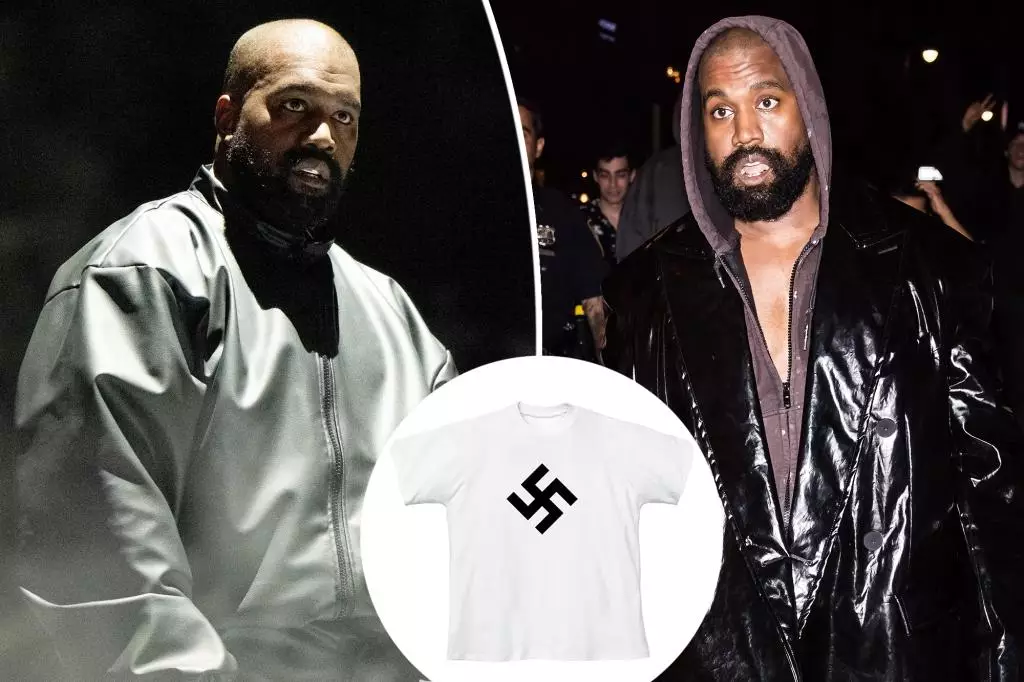In a shocking promotional gamble, Kanye West, who now goes by the name Ye, utilized a Super Bowl advertisement to market a T-shirt adorned with a swastika—a symbol synonymous with hate and oppression. Aimed at directing viewers to his Yeezy website, the shirt, titled “HH-01” and priced at a mere $20, has generated widespread outrage. The shirt’s name is reportedly a coded reference to “Heil Hitler,” which has not only alarmed civil rights organizations but also raised deeper questions about Ye’s intentions and the repercussions of his actions in the current socio-political climate.
The Super Bowl is annually recognized as one of the most-watched sporting events globally; thus, leveraging its platform for a controversial message is a perilous decision. Ye’s advertisement aired in only three select markets: Los Angeles, Philadelphia, and Atlanta. This selective approach may suggest a tactical maneuver—targeting specific demographics that are statistically more engaged with his brand. However, the decision to present such a provocative shirt, especially at an event that is watched by millions, speaks volumes about the normalization of extreme views within certain circles of popular culture.
The choice to shoot the ad using an iPhone—a statement from the artist himself—reinforces the notion that Ye embraces an unconventional approach to art and marketing. Yet, this nonchalance in production belies the seriousness of the underlying message that the T-shirt conveys. Such actions could be interpreted as an attempt to trivialize significant historical and social issues through a medium with high visibility.
Following the airing of the ad, the Anti-Defamation League (ADL) publicly condemned Ye’s actions, reinforcing the perilous implications of his message. The ADL rightly pointed out that the swastika is not merely a graphic design but a historical emblem that inspired and instigated violence and hatred directed at Jews and other marginalized groups during the Nazi era. Their response emphasized that this choice effectively amplifies the already established antisemitic narrative that Ye has been perpetuating in recent months.
The ADL’s assertion that Ye’s actions further exacerbate societal issues surrounding antisemitism and white supremacy highlights the responsibility public figures have when utilizing their platforms. Ye’s reckless promotion of hate through commerce serves not only to bolster his brand but also to endanger vulnerable communities still grappling with the generational trauma of such symbols.
Ye has a long history of pushing boundaries with his art and personal expression, continuously walking the line between genius and insanity. However, his recent ventures have escalated to dangerously socially irresponsible levels. His infamous statements about his affection for Hitler and identification with Fascist ideologies have cast a dark shadow over his artistic legacy, blurring the lines between performance art and hate speech.
Previously, Ye issued an apology to the Jewish community for similar incendiary comments, suggesting some level of awareness regarding the implications of his statements. Yet, his return to such discourse, particularly with the release of the T-shirt, indicates an unsettling pattern. It raises the question: Is Ye capitalizing on controversy as a marketing strategy, or has he genuinely devolved into an echo chamber of his distorted views?
Ye’s antics are part of a larger trend where influential figures monetize controversial narratives, often to the detriment of societal morals. In an era characterized by social and political polarization, rampant misinformation, and a declining sense of accountability, his actions serve as a cautionary tale. The intersection of celebrity culture with problematic ideologies leads to an unsettling compendium that encourages hate rather than healing.
Ultimately, one must ask: what does this signal for the future of creative expression? When symbols of hate and division become commercial products, they challenge the fundamental purpose of artistic expression by intertwining it with consumerism, potentially inciting further societal rifts.
Kanye West’s decision to launch a T-shirt brand featuring a swastika represents more than just an artistic endeavor; it reflects an alarming trend in popular culture where hate is repurposed as merchandise. His actions shed light on a pressing dialogue about ethics in branding and the responsibility of public figures in shaping societal narratives. As consumers and influencers alike reflect on these troubling developments, it is imperative for collective standards of accountability to be established, ensuring that hatred is never trivialized in the name of art or commerce.

